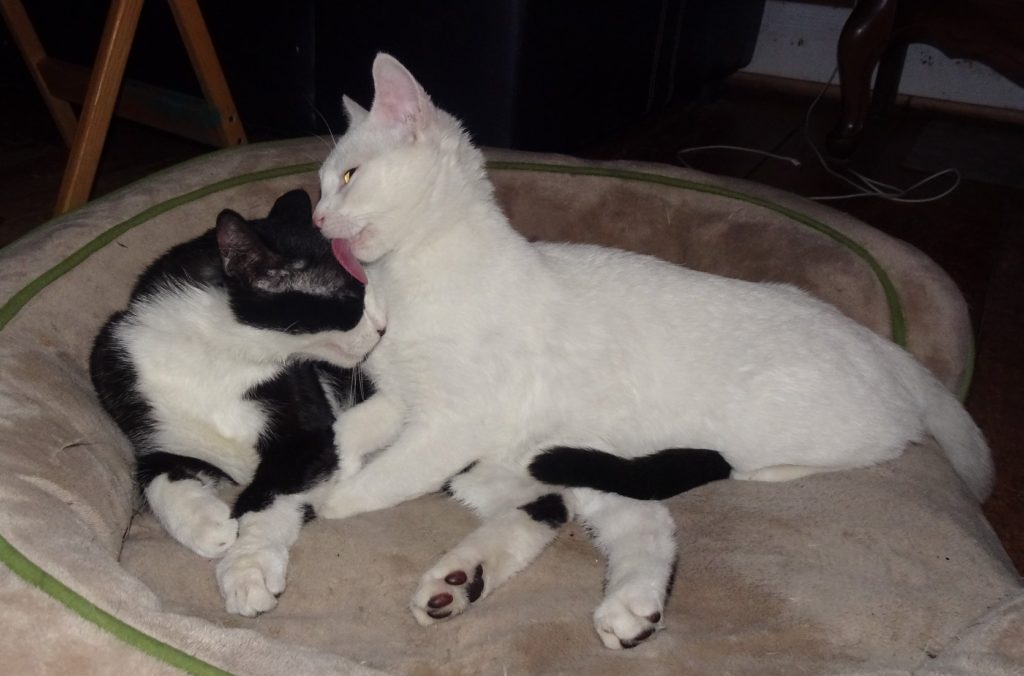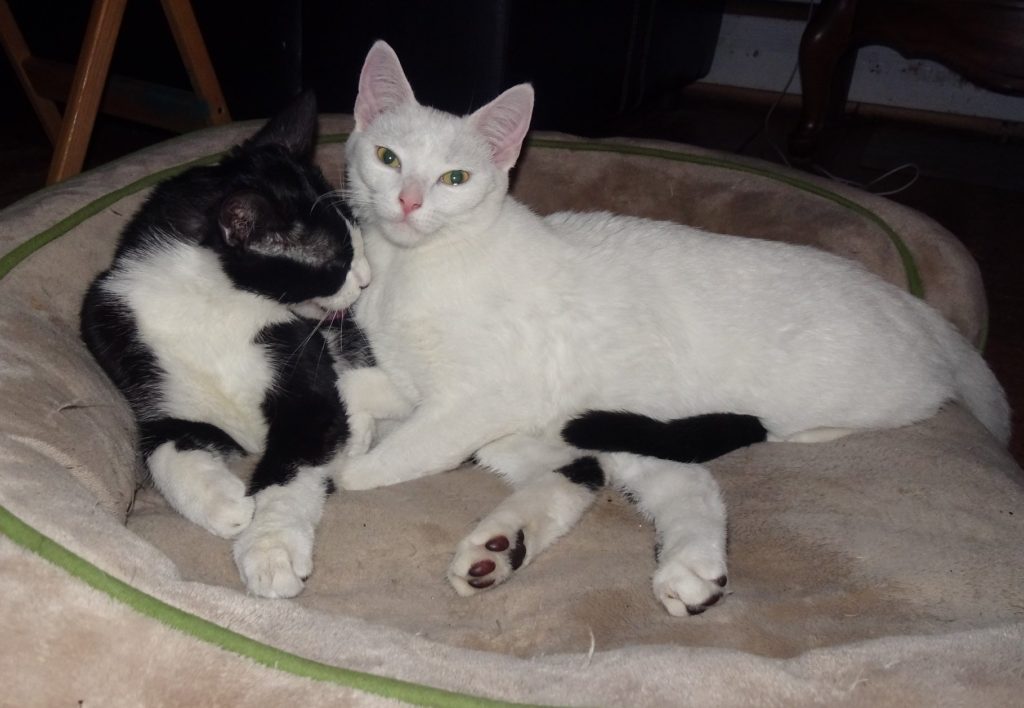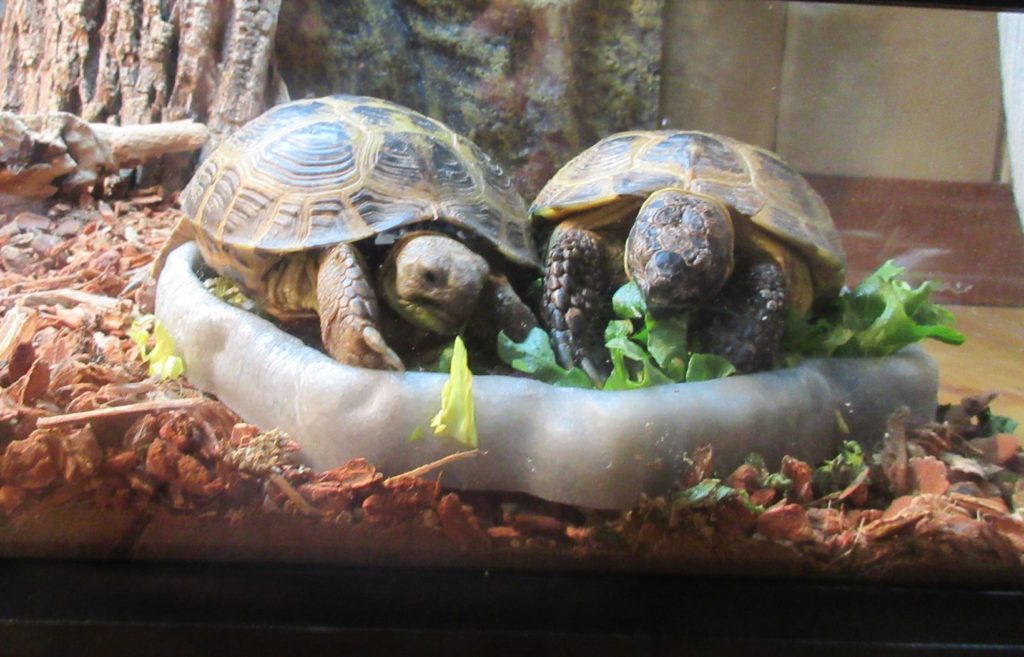Aka Ollie & Millicent, Melody, Milli Vanilli.
As soon as we introduced them to each other, it was love at first sight.


Before we invested in our first exotic pet, our family took a vote. Ballots were cast and counted. At last, the ghastly results were in.
“It was rigged!” I wailed. “A clear-cut case of voter fraud. There was a miscount. I saw Eva cast a vote on behalf of her deceased great-great grandmother. Someone bused in an entire fleet of illegal herbivores. Why do the LaRivieres up the street get a vote? They’re not even French-Canadian! Fools, all of you! Just look at what you’ve done!”
But alas, blind democracy prevailed, the results irreversible—with consequences as cataclysmic as an asteroid blotting out reptilian world domination as they knew it.
Say hello to Bonnie and Clyde, Tyler’s new Russian tortoises!


Every morning I’d walk downstairs and see the Bean, sprawled out her blanket next to the couch she could no longer jump on. I’d wait for a few seconds, watching her belly to see if it was still rising and falling. It always was.
For the past two years, each time she stood up, her legs slipped out from under her, and she’d wait helplessly to be rescued. From the living room through the kitchen to the front door, I lined the wooden, linoleum and tile floors with a path of runners. But adventurous to the end, she couldn’t be contained by the path I set for her. Each time she ventured onto the linoleum, she waited, wobbly legs split beneath her, until I pulled her to her feet and lead her paws to traction.
Walking wasn’t the only thing she’d lost control of. At any given point during the day, the kids would scream, “Bean’s peeing!” And by the time I got to her, there’d be a pool in her wake the size of Lake Superior.
Neighbors would come to our door. “Your dog is lying down and whimpering,” they’d say, shaking their heads. “It doesn’t look like she can get up.”
“She’s old! She’s suffering!” Doug grumbled. “Put her down!”
But I couldn’t. Because as she mechanically pushed through the motions one day at a time, she still stretched out in the sun and peacefully slept. She still ate voraciously, eyes widening in anticipation before I treated her to a handout. And she still intuitively rested her chin on my lap when I was sad. Even though her body was deteriorating, her soul was firmly intact.
Not too long ago, I lay down next to her. Her eyes were cloudy, yet she looked right at me. Her rib cage was bony, her belly was raw and pink from lying on it all day and night. Her face, once outlined by a black muzzle, was now entirely gray.
I wrapped my arms around her head and whispered directly into her ear, which gave away her part pit bull lineage, knowing very well she could no longer hear my voice.
“Bean, I don’t know what you are waiting for. If you’re waiting for me to be ready, you can stop now. Because whether it’s tomorrow or fifty years from now, I am never going to be ready to lose you. So I want you to go when you’re ready. And if you’re having trouble letting go, just find a way to tell me, and I will help you. Can you give me a sign?”
Right at that that moment appeared Milo the cat, who nudged his head against my feet.
When you’re desperate for signs, you assign meanings to the most routine events. Maybe that’s what I was doing. Or maybe Bean was trying to give me a sign and couldn’t do it herself. Whatever the case may be, I put it out of my mind.
Tuesday morning I came downstairs to find her entwined in a string of Christmas lights. (Yes, Christmas lights on July 25. They’ve been strung on my walls all year round for the past decade, in an effort to make magic for the kids all year round.) I don’t know how she got herself into that predicament or many hours she’d been lying there, waiting for me to untangle her.
And just like that, I knew I was asking her to hold on not for her, but for me. Because I’ve had her since I was newly married and thirty years old, and she was there, like a permanent fixture, while I raised my babies. Because I wasn’t ready to close the door on that era. Because I couldn’t fathom the thought that she’d no longer be there. And because I questioned whether I was strong enough to lose her.
I won’t spend too long writing about how I dug her grave in the woods in my back yard, with nothing but a pointy shovel, a bottle of bug spray and a handsaw to cut through the tree roots. Or how I spent the day watching old, sad movies on the porch with her while she slept under an old Dora the Explorer bedspread, with Rosie, her constant canine companion, curled up by her side. Or her last car ride, where she sat in the backseat, eyes fixated on the windows, trying in vain to get up and hang out her head one last time. Or how I wished with all that was in me that the doctor was running late in his appointments, and how my heart sank when I learned he was right on schedule. Or how she flinched when Dr. Humphrey injected the sedative into her muscle.
Dr. Humphrey disappeared for a few minutes to let the sedative kick in, and in those minutes, time traveled.
The Bean was found in 2001, abandoned, roaming the streets in Waterbury, captured and brought to a pound, waiting for the clock to run out before Doug’s Great Aunt Anna arrived. She spotted her out of endless rows of steel cages. She saw her black muzzle, and she thought she looked like Daisy, our Shepherd-Akita. She brought her home and named her Tina.
The first time I lay eyes on Tina, she was a dot at the far end of Aunt Anna and Uncle Andrew’s thirteen-acre property in Falls Village, and once she sighted Daisy by our side, she ran full speed, all four legs blurred into one. She got bigger and bigger, tongue lagging from left to right, until she joyously nearly barreled over Daisy, who would be her companion for the next eight years, before greeting me and Doug with licks to our faces and hands.
Two years later, Aunt Anna got sick and entrusted Tina to our care. When Tina curled up with Daisy on our couch, she looked like a butter bean. The nickname stuck.
I whispered into her ear for a final time.
“Bean, if I had one wish, it would be that time would move backward instead of forward, and I’d get to watch you grow younger and stronger, and I’d do it all over again. My one regret is that I never knew you when you were a puppy. Maybe when your soul is free, you’ll run like you did that first day I met you. But promise me you won’t run too far. Because I need you, and I don’t know what I’m going to do without you…”
I barely heard Dr. Humphrey return. I rested my head on hers and listened to her last labored breaths. I watched as the doctor checked for a heartbeat and told me it was over. Together we covered her with the blanket. Her paws dangled limply as Dr. Humphrey carried her back to my car.
After I buried my Bean, I sat for a long time looking at pictures from over the years. I don’t remember the last time I looked at those pictures. And I was amazed at what I saw.
She had clear, brown eyes that looked like they were looking right through the camera and into my soul. They looked human.
When I saw her eyes from all those years ago, I realized I didn’t lose her that afternoon on the veterinarian’s table. I don’t remember the exact day that she lost the life from her eyes. It must have happened little by little over the course of two or three years. And I was sad that I never looked hard enough to notice.
Grief is a peculiar thing. I realized my heart wasn’t overflowing simply because I missed her already, even though it’d been a few hours since I last saw her. It was because I never said good-bye to young, vibrant Bean who had such a zest for life all those years ago.
I don’t know why she held on for as long as she did. I’d like to think it was for the same reason I did. I like to think that she did it because she loved us too much.
I wondered if it was OK for my 7, 8 and 10-year-olds to see me that way—seeming OK one moment, bustling about and scraping together their dinners—then in a crumpled heap the next.
“Mama, why are you crying?” Eva asked. “You were just smiling a second ago.”
And I told them all about how grief works—how one moment you think you’re feeling better, and the next, a new memory creeps in and hits hard. And I decided it was healthy for them to see it. Maybe someday far away, they’ll use it when their own hearts get broken.
Anna, who was listening, handed me a picture. “It’s the Bean,” she explained. “Look, now she has wings!” Which promptly ignited a new round of tears.
I called in the kids to look at those pictures. Because all that’s in their memories is an old, decrepit dog who fell over when she walked and peed all over the house. And it pains me that they don’t remember who she was before.
She was energy personified, who leaped from the three-foot stoop on our patio, then ran circles around our yard, chasing leaves in the wind.
She was the fierce protector who chased a bear away as he rummaged through our compost.
She was the loyal friend who limped back to me after being attacked by a German Shepherd, forgiveness in her eyes, after I’d run from the attack with my baby stroller.
She was pure happiness, who stretched out four feet long, from head to toe, with her feet straight behind her and her face between her paws.
She was the seeker of affection who wedged her head through the crook in my arm whenever she caught me sitting or kneeling on the floor
She was the gentle soul I sent my babies to whenever they crawled or tottered toward Daisy, old, crotchety, and skittish around kids. “No you don’t! Go play with the Bean,” I’d redirect them, and the Bean would lie there patiently, tail thumping, while they climbed all over her like a horse.
They read to her, they napped with her, they shared dinners with her, they dressed her up. She was the first friend my children ever had.
Beyond a near 80-year-old woman stumbling upon her in a pound, I don’t understand the series of events or forces of nature that brought me together with the Bean. But there are two things I know for certain.
I am certain when I reach that same age, I will remember her.
And when I look at Anna’s drawing, taped to our refrigerator, there is one more thing I understand.
Dogs don’t have to die before they earn their wings.